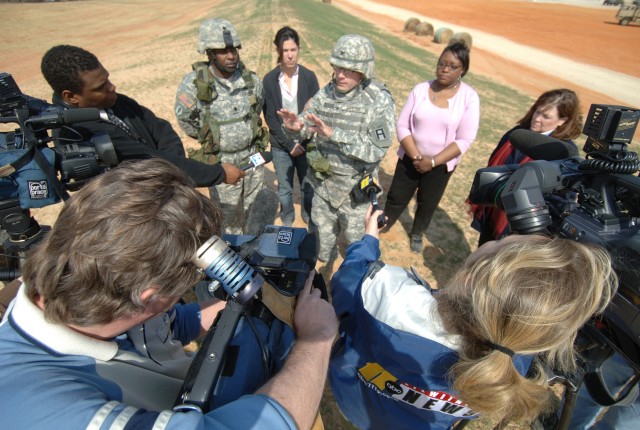FORT BRAGG, N.C. (Army News Service, March 21, 2007) - Stabilizing, securing, reconstructing and developing Afghanistan so it can sustain itself as a self-functioning democracy is the mission of the Provincial Reconstruction Team.
Traditionally, a PRT consisting of Soldiers, Sailors, Airmen and civilians from such agencies as the Department of State and the Department of Agriculture would assemble in theater and go about the mission of meeting with local leaders and establishing a hierarchy of needs to best assist the local population.
However, for the first time, 12 PRTs, including civilians, military and even native Afghans - more than 1,000 personnel in total - were brought together at Fort Bragg, N.C., before deploying to undergo three months of intense theater-immersion training conducted by the professional trainers of the 189th Infantry Brigade, First Army.
Gathering all the elements of the PRT at Fort Bragg and giving them tough, realistic repetitive training adds real meaning to First Army Commanding General, Lt. Gen. Russel L. Honore's doctrine to "train like you're going to fight."
According to Col. Mark Fields, commander, 158th Infantry Brigade, First Army, which is providing support to the 189th for the PRT training, bringing the PRTs together before deploying is a great step forward in ensuring mission success.
"Considering this training used to be one small lane of the larger deployment training objectives, having all the PRTs together and immersing them in the theater-specific environment they will encounter in Afghanistan before they get to Afghanistan is invaluable," Fields said.
"At the forward operating bases where we train the PRTs, we can throw any scenario at them," Fields explained, "from sniper attacks and IEDs to babies being born and electricity being turned on, and explain right away what was done right and what needs more repetition. For added realism and to hone language and cultural skills, 50 Afghan policemen volunteered to come to Fort Bragg not only to enhance the troop training, but to improve their own police skills.
Language labs are also located at each FOB so troops can gain language skills before deploying, Fields said.
"Finally, the civilian members of the PRTs from the State Department, Department of Agriculture and the U.S. Agency for International Development joined us during the final few weeks to teach cultural awareness and integrate with their military counterparts they'll deploy with," he said.
Under theater immersion, the PRT commanders not only trained for their mission at Fort Bragg, but they have already been to the parts of Afghanistan where their PRTs will work side by side with the Afghans.
"All the senior leaders of the 12 PRTs have already gone to the part of Afghanistan where they'll deploy," stated Fields. "They've done a 'right-seat ride' in the province with the current PRT commanders; they've seen the daily interaction between the PRT members and the Afghan people; and they've met the local tribal and religious leaders they'll work with so there will be a continuity of operations and a smooth transition from one PRT to the next."
On the day a group of reporters visited the FOBs, the commander of PRT-7, Air Force Lt. Col. Gordon Phillips, was meeting with the elders of "Freedom City" to discuss problems facing the citizens. Under the training scenario, the village had been badly damaged by an earthquake, the clinic was running low on medicines, medical equipment was either outdated or not working, and the Russian generator the village used was broken. Phillips, accompanied by an interpreter, toured the village with the tribal leaders and established a plan to get badly needed medical supplies to the village and to get engineers to repair the broken generator.
Asked about the training provided by the 189th Infantry Brigade, Phillips was very appreciative.
"From the very beginning, this has been the most relevant, logical training I have received before any deployment," Phillips said. "I have already been to the area of Afghanistan where our PRT will work. I have already met with the religious and tribal leaders we will be helping, and, more importantly, they have met me. The fact that we have met and established personal relationships with the people we're trying to help will make the transition from one PRT to another much easier. Plus, having all members of the PRT together before deploying gets everyone on the same sheet of music so we can spend more time providing security and promoting the stability the Afghans need."


Social Sharing